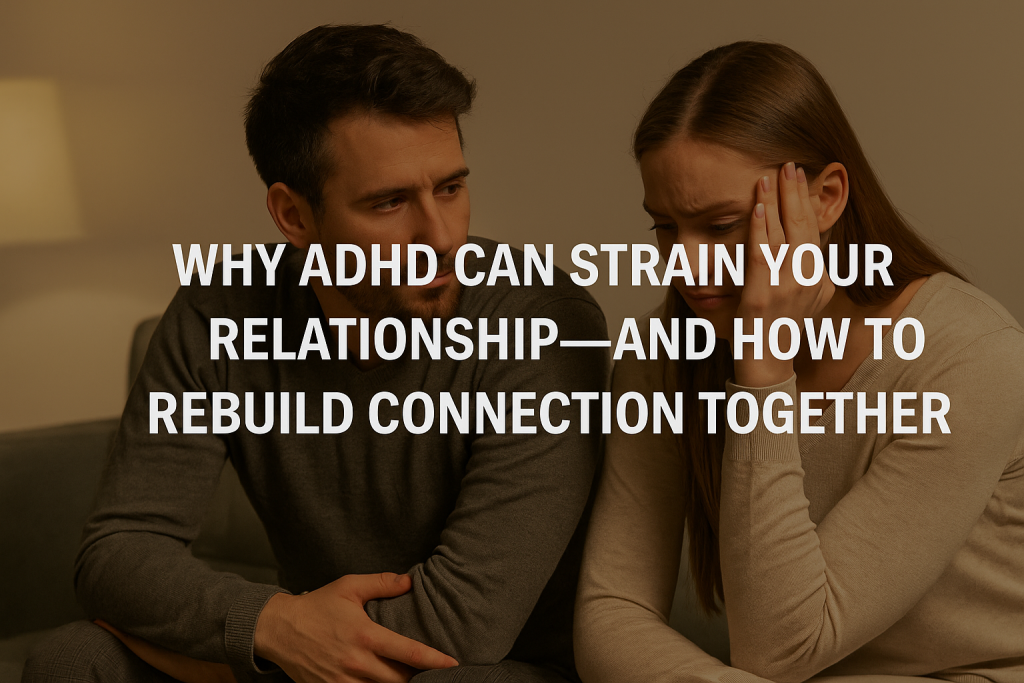
By Karen Gosling, Relationship Therapist & ADHD/ASD Specialist
When people think about ADHD, they often imagine a distracted child or a hyperactive teen. But Adult ADHD is real, and it affects far more than just focus. One of the most overlooked impacts? Your most important relationships.
Whether you’re the partner with ADHD or the one loving someone who has it, chances are you’ve experienced misunderstandings, emotional disconnect, or conflict that seems to come out of nowhere.
And you’re not alone.
ADHD and Emotional Chaos: It’s Not Just About Focus
Adult ADHD isn’t just a problem with attention—it’s a neurological condition that affects how a person thinks, feels, and behaves. It influences impulse control, emotional regulation, and even how someone responds to conflict or affection.
Here’s what it can look like in a relationship:
- An ADHD partner forgets to follow through on promises—causing hurt and frustration.
- Conversations get derailed by distractions or irrelevant comments.
- Emotions escalate quickly—what starts as a small issue ends in an argument.
- One partner feels constantly criticised, while the other feels constantly misunderstood.
These aren’t character flaws. They’re symptoms of how the ADHD brain is wired—and without support, they can quietly wear down a relationship over time.
Inside the ADHD Brain: What Your Partner Might Not See
If you have ADHD, you may already know how it feels:
- Your brain never switches off. Thoughts race at night. Sleep is hard.
- You react before you realise. A sharp comment slips out, and you don’t know why.
- You’re constantly thinking “What if?”—anxiously preparing for the worst.
- No matter what you achieve, you feel like you’re falling short.
And then comes the frustration—because there’s so much inside you, so much potential, but it’s tangled in emotional overwhelm and misunderstood reactions.
Your partner might interpret this as carelessness or selfishness—but in truth, you’re trying hard just to stay grounded.
Why ADHD Breaks Connection (and How to Start Repairing It)
Relationships require trust, empathy, and emotional safety. But ADHD can unknowingly damage all three:
- Tactless comments? They’re not meant to hurt, but they do.
- Forgotten dates or appointments? Not intentional, but still disappointing.
- Bursts of anger? They’re over quickly, but the emotional scars linger.
If your partner tells you you’re being distant, moody, or inconsiderate—you might not even remember what you did. That’s the disconnect. And it creates a cycle of hurt, defensiveness, and withdrawal.
But here’s the good news: You can change this.
How Couples Can Work Together Through ADHD
When ADHD is acknowledged and supported, it can bring couples closer together—not further apart. The key lies in understanding the emotional impact, not just the behaviour.
💬 Communication Tips for ADHD-Affected Relationships:
- Slow down arguments. Use a pause button. ADHD brains react fast—your heart needs time to catch up.
- Don’t rely on memory. Use reminders, whiteboards, shared calendars.
- Validate emotions, not just logic. Your partner’s feelings matter, even if you didn’t “mean it that way.”
- Laugh together. ADHD people are often funny, spontaneous, and passionate—lean into that joy.
From Struggle to Strength: Reclaiming Your Connection
Yes, ADHD creates challenges. But it also brings amazing qualities to a relationship:
- 🧠 Creativity – You think differently, solve problems inventively.
- ❤️ Passion – You love deeply and intensely.
- ⚡ Energy – You bring spontaneity and fun.
- 💡 Insight – When focused, you see possibilities others miss.
I help couples unwrap these gifts while managing the emotional struggles. Because you don’t need to keep fighting the same fight—you can learn new tools, new language, and new ways to reconnect.
You Deserve a Relationship That Works—Even with ADHD
Don’t let ADHD define your relationship. With the right support, understanding, and communication tools, you can both thrive.
👉 Ready to stop the cycle of frustration and start building emotional safety again?